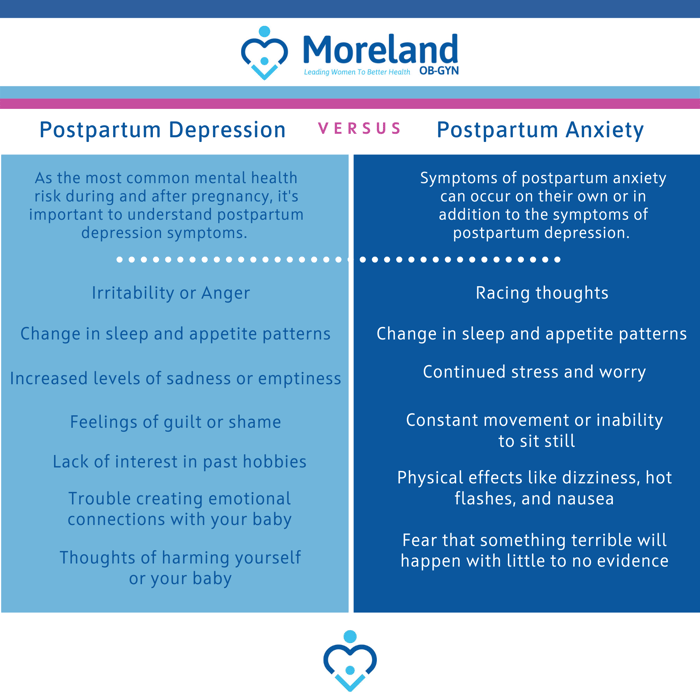 “You can’t pour from an empty cup.” This saying may be overused, but the lesson is always relevant and especially true for motherhood. Some moms think filling their cup means eating healthy and going to their prenatal checkups; however, your mental health plays a huge role in being able to keep your glass full.
“You can’t pour from an empty cup.” This saying may be overused, but the lesson is always relevant and especially true for motherhood. Some moms think filling their cup means eating healthy and going to their prenatal checkups; however, your mental health plays a huge role in being able to keep your glass full.
Unfortunately, when the topic of mental health is brought up, there’s often a stigma around those who talk about it - especially with new and expecting mothers. However, as you welcome your little one into your life, it becomes even more incredibly important than ever to take care of your mind, know the signs of poor mental health, and know when—and how—to ask for help.
Let’s begin by learning why women can be more susceptible to mental illnesses in comparison to men, then dive into common perinatal mood and anxiety disorders, as well as share Moreland’s resources and support for your emotional health journey.
How Gender Affects Mental Health
 Have you ever felt like you just have more rough days, mentally, than the men in your life? If so, you aren’t alone, and you may be on to something. While studies have shown that mental health illness diagnoses are under-reported for men, several biological and sociocultural factors have a larger impact on women as a whole.
Have you ever felt like you just have more rough days, mentally, than the men in your life? If so, you aren’t alone, and you may be on to something. While studies have shown that mental health illness diagnoses are under-reported for men, several biological and sociocultural factors have a larger impact on women as a whole.
Anxiety and depression are simply more prevalent in females because women’s bodies and mental health capabilities are affected differently during different time periods. Adolescence, reproductive years, perimenopause, and menopause are all developmental stages for women that interact differently with their mental health.
Furthermore, as hormones increase and preparation for the baby take over thoughts, the chances of struggling with mental health can increase.
Perinatal Mental Health
Pregnancy can bring on spikes in mood and feelings of stress and exhaustion alike. But while short-term lapses of these feelings are normal, it’s important to understand the signs of something more serious. Broader mental health concerns related to pregnancy can arise at any time during your pregnancy, especially during the fourth trimester (the 12 weeks following birth). If your symptoms last longer than two weeks, it’s essential to connect with your physician to get further support and treatment.
Perinatal Mood and Anxiety Disorder (PMAD)
Perinatal Mood and Anxiety Disorders (commonly referred to as PMAD) can range in severity and encompass the four key postpartum disorders seen most often in new and expecting mothers.
Approximately 15 to 20% of women experience a PMAD after giving birth. Another 10% of women experience a PMAD in the antepartum period (during pregnancy). The chance of developing a PMAD is significantly higher for women who are coping with poverty and twice as high as those numbers for teenage moms.
However, even without the prior disadvantages present in a woman’s life during or after pregnancy, postpartum depression is still the most common medical complication after childbirth. This even includes complications involving physical health issues postpartum.
The five most common postpartum mental health disorders for women are postpartum depression, postpartum anxiety, postpartum OCD, postpartum psychosis, and postpartum traumatic stress disorder.

Postpartum Depression

As the most common mental health risk during and after pregnancy, it’s important to understand postpartum depression symptoms. Common symptoms include but are not limited to:
- Irritability or anger.
- Change in sleep and appetite patterns.
- Increased levels of sadness or emptiness.
- Feelings of guilt or shame.
- Lack of interest in past hobbies.
- Trouble creating emotional connections with your baby.
- Thoughts of harming yourself or your baby.
Postpartum Anxiety
Symptoms of postpartum anxiety can occur on their own or in addition to the symptoms of postpartum depression. The most common signs include but are not limited to:
- Constant movement and inability to sit still.
- Continued stress and worry.
- Fear that something terrible will happen with little to no evidence.
- Change in sleep and appetite patterns.
- Racing thoughts.
- Physical effects like dizziness, hot flashes, and nausea.
Postpartum OCD
While less common, Postpartum OCD is important to understand as women enter motherhood. Studies show an estimated 3 to 5% of new mothers will experience these symptoms and do not need a history of past OCD symptoms for diagnosis. Symptoms include but are not limited to:
- Persistent intrusive thoughts centered around your baby, often portrayed in an upsetting or frightening manner.
- Compulsive needs to perform repetitive actions in order to reduce fears.
- Continued feelings of fear, especially around your child.
- Hypervigilant behavior to protect your baby to extreme levels.
Postpartum Post-Traumatic Stress Disorder
 In situations where deliveries are especially difficult—such as near loss of life, prolonged NICU admittance, etc.— new mothers may experience post-traumatic stress in the postpartum weeks that follow. You may be experiencing PTSD if you’ve experienced any of the following symptoms:
In situations where deliveries are especially difficult—such as near loss of life, prolonged NICU admittance, etc.— new mothers may experience post-traumatic stress in the postpartum weeks that follow. You may be experiencing PTSD if you’ve experienced any of the following symptoms:
- Intrusive memories of past traumatic events
- Nightmares
- Feelings of anxiety
- Detachment from reality
- Behavior of distancing from aspects of the trauma (including people or locations)
Postpartum Psychosis
Postpartum psychosis occurs in 0.1 to 0.2% of postpartum patients. It is rare but it is a medical emergency. Symptoms usually begin and are usually sudden within the first two weeks after giving birth.
The symptoms of postpartum psychosis can include:
- Hallucinations or delusions – thoughts or beliefs that are unlikely to be true.
- Similar signs of bipolar disorder.
- Feelings of fearfulness, restlessness, and confusion.
Women with postpartum psychosis can hurt themselves and their children. The good news is that it is treatable, however, it is a medical emergency.
Please remember that if you are talking with your nurse or provider about your feelings of anxiety or depression, this does not mean that somebody will call the police or that you have to go to the emergency room. Postpartum psychosis is rare but still very important to address. Postpartum depression and anxiety are much more common and our staff and providers are here to support you.
Matrescence: The Transition to Motherhood
 While becoming a mother can be an extremely exciting time, there are constant hurdles to overcome during this period. From how your body changes to how your mind perceives everything around you, there’s a lot to balance. In fact, there’s a word for this stage in a woman’s life: matrescence.
While becoming a mother can be an extremely exciting time, there are constant hurdles to overcome during this period. From how your body changes to how your mind perceives everything around you, there’s a lot to balance. In fact, there’s a word for this stage in a woman’s life: matrescence.
Matrescence, or the transition into motherhood, is centered around how your body reacts and changes throughout each stage of pregnancy. As life changes around you with a growing family, disruptions to your career, and relationships impacted, matrescence is the idea of how your body reacts to everything that pregnancy and motherhood encompasses.
As you begin your journey through the effects of matrescence, it’s important to know that you aren’t alone. One of the first steps to managing your emotional health is seeking help from counseling and talk therapy services. This is why Moreland OB-GYN has partnered with Cornerstone Counseling to ensure that expecting mothers have every resource available for a healthy and happy delivery and beyond.
Moreland OB-GYN & Cornerstone Counseling
Here at Moreland, it’s important to us that we provide you with every resource we can to ensure you’re taken care of at each stage of your pregnancy and life. This is why we’ve partnered with Cornerstone Counseling and other local therapists. If you ever experience symptoms of a perinatal mood and anxiety disorder, we will support you each step of the way with check-ins and expert therapists that place women’s mental health as their top priority.
We encourage our patients to reach out to the resources that we refer them to but if your financial situation or coverage isn't a great fit, let us know and we can offer additional resources.
Asking for help is hard; however, you can trust that the experienced Moreland providers and staff are readily equipped to support you if you develop any of the emotional health issues above.
Moreland takes pride in being unique in how we approach patient care. This means having an outreach nurse that calls you two weeks and six weeks postpartum to check on you, look for signs of necessary additional support, provide a listening ear and a caring heart, and be there to refer you to a counselor if desired or help set up an appointment with their provider or APP.
If you ever need support between check-ins, know that you can always reach out to our triage department to get immediate help.
Moreland OB-GYN Is Here for You
 At Moreland, we care about our patients as an entire person. From your physical to your emotional health, we’re here for you every step of the way. If you’re experiencing any of the symptoms above, or any intrusive thoughts that take over your daily life, know that it’s okay to ask for help. Know that it’s not your fault, it’s normal, and you can reach out at any time to receive help and guidance for any situation you may be going through.
At Moreland, we care about our patients as an entire person. From your physical to your emotional health, we’re here for you every step of the way. If you’re experiencing any of the symptoms above, or any intrusive thoughts that take over your daily life, know that it’s okay to ask for help. Know that it’s not your fault, it’s normal, and you can reach out at any time to receive help and guidance for any situation you may be going through.
The providers at Moreland OB-GYN are dedicated to providing women with compassionate OB-GYN care throughout their life. This includes complete obstetrical care, gynecology, gynecologic and obstetric surgery, fertility services, preventive health care, and more.
You can request an appointment online or give us a call at (262) 544-4411. We have convenient locations in Brookfield, Mukwonago, Oconomowoc, Sussex, Watertown, and Waukesha.









